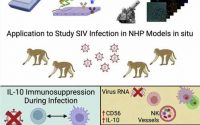Vitamins, OTC Drugs May Interact With HIV Antiretroviral Therapy
Over-the-counter medications, food supplements, and other drugs may interact with antiretroviral therapy (ART) in people living with HIV and be harmful, an industry-sponsored clinical survey from Denmark reports.
“Our study confirms that polypharmacy and being on a protease inhibitor-based regimen increase the risk of potential drug-drug interactions (PDDIs) considerably and highlights the importance of questioning people living with HIV (PLWH) about dietary supplement intake,” the authors, led by Michaela Tinggaard, MD, Copenhagen University Hospital, write in HIV Medicine.
“Potential drug-drug interactions were common among our study population. Although the clinical significance of the majority of the identified PDDIs may be low, most of them were avoidable through a change or discontinuation of the comedication, a change in ART or by spacing drugs,” they add.
Senior author Thomas Benfield, MD, DTMH, DMSc, a professor of infectious diseases at the University of Copenhagen, and colleagues collected information on prescription medication, over-the-counter medication, and dietary supplements from adults living with HIV who received ART from two outpatient clinics.
The researchers estimated the prevalence of non-HIV comedications, and they used the University of Liverpool HIV Drug Interactions database to identify potential drug-drug interactions. They evaluated PDDIs and used logistic regression models to investigate links between PDDIs and relevant variables.
The study included 337 people living with HIV receiving ART. The median age was 53 years, 77% of them were male, and 96% were virally suppressed, with HIV-RNA viral load <50 copies/mL.
Overall, 26% of participants received five or more comedications, and 56% took dietary supplements.
-
In the medication lists of 52% of patients, the authors identified coadministration of drugs that required dose adjustment or monitoring.
-
4.5% of patients were taking drugs that should not be coadministered.
The researchers detected several factors that independently predicted PDDIs:
-
male sex (odds ratio (OR), 1.9; 95% CI, 1.0 – 3.4)
-
being on a protease inhibitor (OR, 4.3; 95% CI, 1.9 – 9.7)
-
receiving five or more comedications (OR, 3.3; 95% CI, 1.5 – 7.2)
-
taking over-the-counter medications (OR, 1.9; 95% CI, 1.1 – 3.3)
-
taking dietary supplements (OR, 2.0; 95% CI, 1.2 – 3.3)
Comorbidities and OTC Medications Increase in Aging People with HIV
Indira Brar, MD, an infectious diseases senior staff physician and the medical director of HIV services at Henry Ford Health in Detroit, Michigan, called the study and important resource for educating providers and patients about over-the-counter drugs.
“The main strength of the study is that it includes a decent number of aging patients living with HIV, the age group in which we worry about drug interactions,” she told Medscape Medical News in an email.

Dr Indira Brar
“As patients get older, they have increased comorbidities. As comorbidities increase, the number of medications increases. As the number of medications increases, the drug interactions increase,” said Brar, who was not involved in the study. “Also, as patients get older, they tend to take more over-the-counter drugs.”
Brar explained how drug-drug interactions can harm patients.
“Drugs added to a patient who is already on ART could decrease the level of the ART and cause the patient to develop a drug-resistant HIV infection,” she said. “Or the ART the patient is on can increase the levels of the new drugs that have been added, and that could have potential toxicity and side effects.
“Food supplements, including multivitamins, calcium, and magnesium, are often overlooked because we think they’re benign. But these drugs can bind our new antiretrovirals, the integrase inhibitors. They can decrease their levels in the patient and cause drug-resistant HIV infection.
“In our clinic, we always tell our patients to please call us before they take any medication, so we can make sure there is no drug interaction,” Brar said.
Nan Wang, PharmD, a clinical pharmacy specialist at University Hospitals Cleveland Medical Center in Cleveland, Ohio, noted in an email that drug-drug interactions with ARTs are common.

Dr Nan Wang
“Understanding the prevalence of antiretroviral drug interactions in a patient population can help identify certain medications that require enhanced vigilance and can guide our clinical interventions,” said Wang, who was not associated with the research.
Joseph Alvarnas, MD, a hematologist and oncologist at City of Hope Comprehensive Cancer Center in Duarte, California, said that this is “a methodologically sound and well-designed study that’s a timely, important reminder that providers need to think carefully and comprehensively when caring for their patients living with HIV.”
Alvarnas, who was not involved in the study, said that, with the widespread availability of ART, HIV has become a chronic, manageable condition in an aging population.

Dr Joseph Alvarnas
“ART agents, particularly the ritonavir-boosted protease inhibitors, increase the likelihood of patients having a potentially significant drug-drug interaction with one of their chronic care medications,” he added. “Even seemingly low-risk supplements such as multivitamins may result in a negative impact upon effective ART treatment of PLWH.”
“The essential next step is that these findings are integrated carefully into decision-support systems, electronic health record prescribing systems, and pharmacy safety-check systems to ensure that we reduce the risk of patient harm,” Alvarnas advised.
Benfield and several study co-authors report financial relationships with GlaxoSmithKline and other pharmaceutical companies. Other co-authors, as well as Alvarnas, Brar, and Wang, report no relevant financial relationships. The study was supported by GlaxoSmithKline.
HIV Med. Published online May 6, 2022. Abstract
For more news, follow Medscape on Facebook, Twitter, Instagram, YouTube, and LinkedIn
Source: Read Full Article


